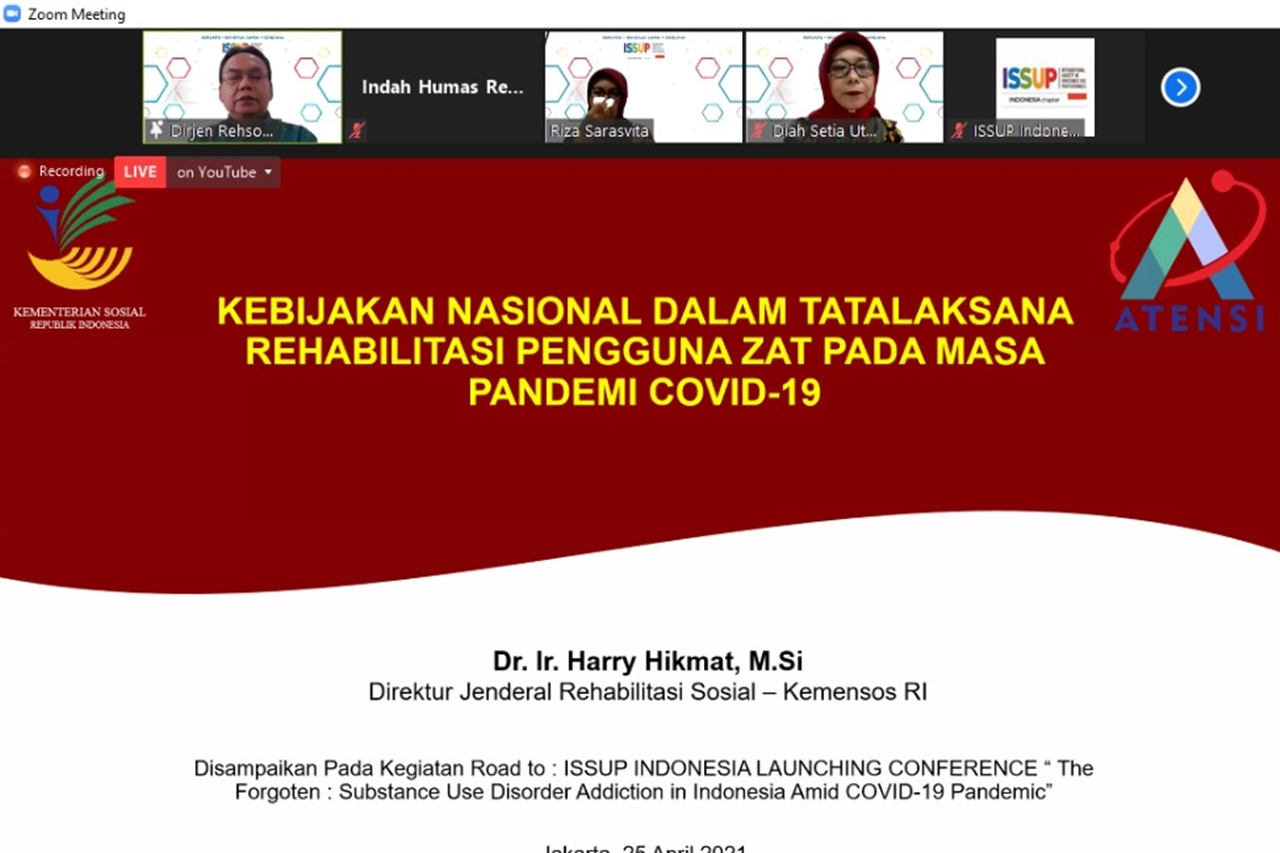JAKARTA (April 25, 2021)
- The Director General of Social Rehabilitation of the Indonesian
Ministry of Social Affairs, Harry Hikmat conveyed the National Policy on
the Management of Rehabilitation of Substance Use during the Covid-19
Pandemic. This was conveyed in the Webinar Series Road To ISSUP
Indonesia Launching Conference.
The International Society of
Substance Use Professionals (ISSUP) is a global non-profit organization
that supports professional development and development in prevention and
therapy related to drug demand reduction (breaking the chain of drug
users).
In his presentation, Harry revealed that the government's
efforts in social rehabilitation for victims of drug abuse are
regulated in Law Number 35 of 2009 concerning Narcotics and Regulation
of the Minister of Social Affairs Number 16 of 2020 concerning Social
Rehabilitation Assistance (ATENSI).
Nationally, the direction of
this social rehabilitation policy is to provide respect, protect and
fulfill the rights of victims of drug abuse, and strengthen social
rehabilitation systems that are integrated with social security, social
empowerment, and social protection of beneficiaries.
This policy
direction also extends the reach of beneficiary social rehabilitation on
a family, community, and/or residential basis strengthens the
institutional and capacity of social rehabilitation centers and Social
Welfare Institutions (LKS), increases social campaigns about the dangers
of drugs and increases the role of the community and the private sector
in rehabilitation services. social.
Harry
added, based on Law Number 11 of 2009 concerning Social Welfare, of
course, Social Rehabilitation can be carried out in a persuasive,
motivating, coercive manner, both in families, communities, and social
institutions.
So the Ministry of Social Affairs ensures Social
Rehabilitation Assistance (ATENSI) services for drug victims are
provided in the form of meeting the needs of a decent life, social care,
family support, therapy (physical, psychosocial, mental, and
spiritual), vocational training and/or entrepreneurship coaching, social
assistance, and assistance social and accessibility support.
The
importance of vocational training services is to open beneficiary
access to alternative productive activities that can realize their
socio-economic independence.
"Hopefully, the Technical
Implementation Unit (UPT) of the Ministry of Social Affairs can become a
rehabilitation and referral center for the community, especially
community organizations such as Compulsory Report Receiving Institutions
(IPWL) and Social Welfare Institutions (LKS) managed by the Regional
Government and the private sector," Harry explained.
Going
forward, the Minister of Social Affairs, Tri Rismaharini directed as
many as 41 UPT Social Rehabilitation functions to be optimized through
multi-function services. Previously, social rehabilitation services only
handled certain social problems, such as victims of drug abuse, now
they have to be able to handle other social rehabilitation clusters,
namely children, the elderly, persons with disabilities, as well as
socially disabled and victims of trafficking in persons.
"With
this multi-functional service, you can double the range of services and
the presence of the Ministry of Social Affairs in the community will
become more significant," said Harry.
During the Covid-19
pandemic, the Ministry of Social Affairs implemented efforts to
anticipate the spread of Covid-19 by providing social rehabilitation
services by issuing social rehabilitation guidelines pandemic in
collaboration with the United Nations Office of Drugs and Crime (UNODC).
These guidelines serve as a reference for UPT, IPWL, LKS, and the
general public in providing services to victims of drug abuse.
This
guide contains information about the Covid-19 Pandemic, groups at risk
of exposure, early detection of Covid-19, handling stress during a
pandemic, self-isolation for infection prevention and control,
recommendations for independent isolation procedures, management of the
flow of rehabilitation services for drug victims during a pandemic, both
inpatient, outpatient and for visitors to online counseling.
The
Ministry of Social Affairs has carried out social rehabilitation
services during the Covid-19 pandemic by counseling, FSG and online case
discussions, online education, and information services for students
and students, facilitating residential beneficiaries (in the center) to
continue taking exams online, responding the case of punk children
during the pandemic and the handling of street children victims of drug
abuse in Mojokerto, East Java.
During the Pandemic, the Ministry
of Social Affairs also made efforts to empower child victims of drug
abuse by opening a millennial cafe and a shoe business with the Dragoby
(sports shoes) and JR King (leather shoes and sandals) brands in
Mojokerto.
The Ministry of Social Affairs has also endeavored to
empower the beneficiary's distro t-shirt business, known as REMBAKA
products in Baturraden. Now products consisting of t-shirts, tote bags,
glasses/mugs, and other screen printing products have entered well-known
e-commerce.
"Minister of Social Affairs, Mrs. Tri Rismaharini
said that social rehabilitation is not only psychosocial assistance but
also social empowerment assistance so that they can get economic
opportunities," concluded Harry.
Chairperson of ISSUP Indonesia
National Chapters, Diah Setia Utami hopes that ISSUP will become a place
to exchange information, education, and technology for handling
drug victims. Then to network and synergize between practitioners,
government, and society in drug demand reduction.
The
webinar which lasted for approximately 3 hours presented competent
speakers from the BNN Lido Rehabilitation Center, FKUI-RSCM, and UNODC. A
total of 311 participants from the UPT Ministry of Social Affairs,
IPWL, LKS, practitioners, and addiction counselors attended this
webinar.
 Bahasa
Bahasa
 English
English


